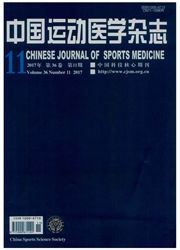

 中文摘要:
中文摘要:
目的:了解过度训练对巨噬细胞活性氧生成能力的影响及其相关机制。方法:8周龄健康雄性Wistar大鼠16只,随机分为安静对照组和过度训练组,每组8只。过度训练组进行11周递增负荷跑台训练,最后一次训练结束后36 h断头处死,分离纯化腹膜巨噬细胞。流式细胞术测定其活性氧(ROS)生成量,荧光定量PCR技术测定NADPH氧化酶gp91phox、p22phox、p47phox亚基和葡萄糖-6-磷酸脱氢酶(G6PD)基因表达。结果:与安静对照组相比,过度运动组巨噬细胞ROS生成量显著降低(P=0.003),gp91phox、p22phox亚基表达量无显著变化(P〉0.05),p47phox亚基表达量显著增加(P〈0.05),G6PD表达量无显著差异(P〉0.05)。结论:过度训练可显著降低大鼠腹膜巨噬细胞ROS生成水平,这并非通过抑制NADPH氧化酶亚基表达和抑制NADPH氧化酶生成途径实现,可能有其它调控机制参与。
 英文摘要:
英文摘要:
Objective To investigate the effect of overtraining on the ROS(reactive oxygen species)production in pritoneal macrophages.Methods Sixteen male Wistar rats were randomly and equally divided into 2 groups: sedentary group(C)and overtraining group(OT).Rats in OT group was forced to train on a treadmill for 11 weeks with an incremental protocol.36 hours after the last training,decapitation of all rats were performed,and then peritoneal macrophages were isolated and purified.The ROS production and the mRNA expression of G6PD and NADPH-oxidase subunits(gp91phox,p22phox,p47phox)were determined by FACS and real time-PCR.Results After 11-week training,the OT group showed significantly decreased ROS production in pritoneal macrophage when compared with the C group(P = 0.003).The expression of the membrane components of NADPH-oxidase(p22phox,gp91phox)and G6PD changed insignificantly(P〉 0.05),whereas the expression of p47phox mRNA levels increased significantly(P〈 0.05).Conclusion Overtraining significantly reduces the ROS production in pritoneal macrophage of rats without suppression of the expression of NADPH-oxidase subunits or the pathway of NADPH-oxidase production.Further investigation of the mechanism involved in this process is needed.
 同期刊论文项目
同期刊论文项目
 同项目期刊论文
同项目期刊论文
 Overtraining Inhibits Phagocytosis and ROS Generation of Peritoneal Macrophages: Role of IGF-1 and M
Overtraining Inhibits Phagocytosis and ROS Generation of Peritoneal Macrophages: Role of IGF-1 and M 期刊信息
期刊信息
